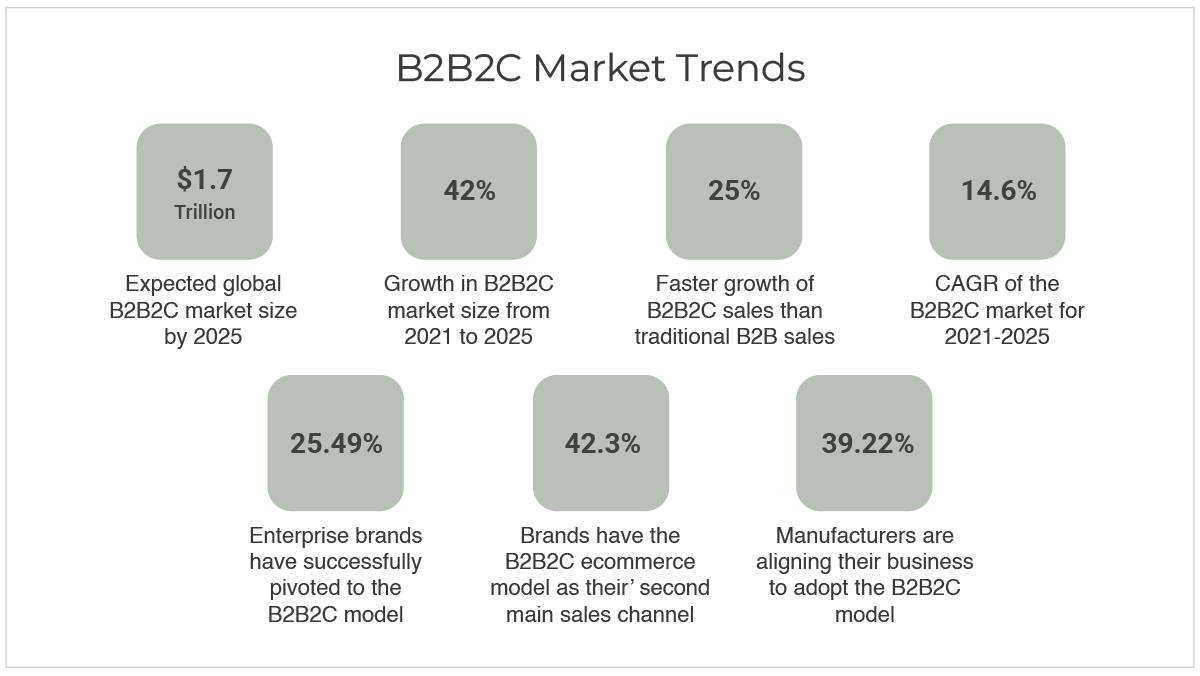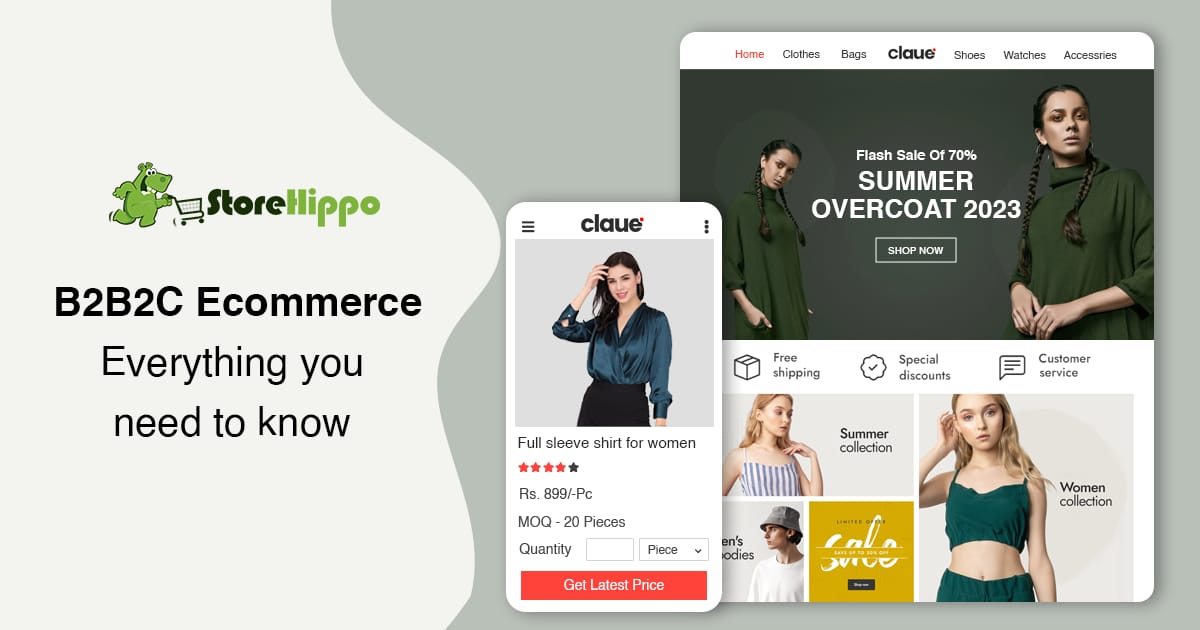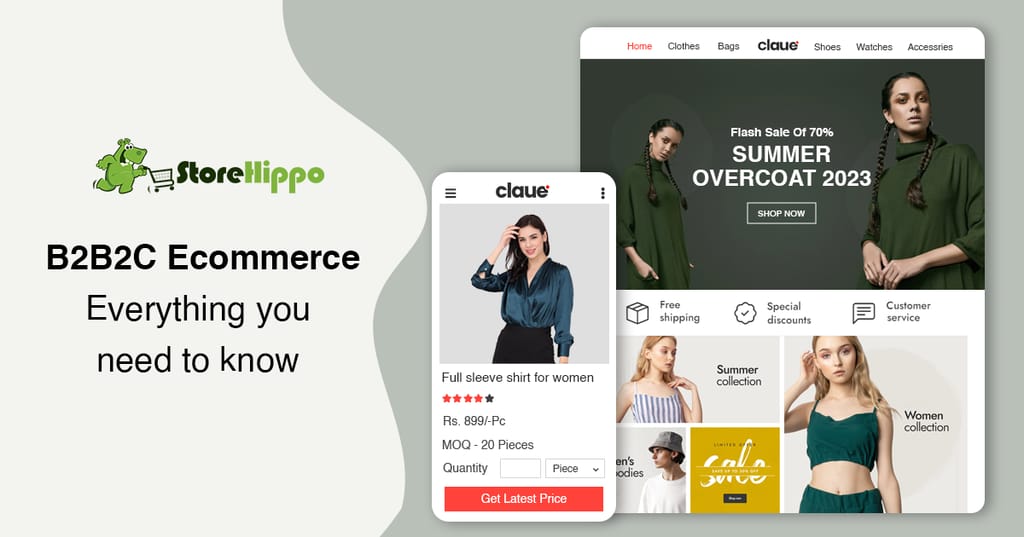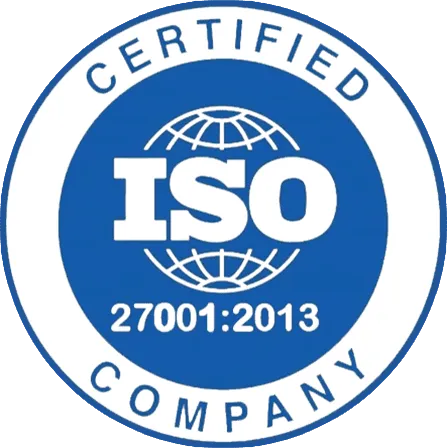With the changing rules of ecommerce, it has certainly become tough to sustain the market.
And you are unknowingly limiting your growth by selling just to B2B or just to B2C.
What’s the way forward then?
What if we say you can transform your business by leveraging the B2B model to eventually sell to the end customers?
Wonder how?
Enter - B2B2C ecommerce solutions
A B2B2C marketplace combines both B2B and B2C into a single online model.
And if you are still confused as to how a combined business model will yield results, look at a few B2B2C market trends:

- $1.7 trillion is the expected global B2B2C market size by 2025
- 42% growth in B2B2C market size from 2021 to 2025
- 25% faster growth of B2B2C sales than traditional B2B sales
- 14.6% CAGR of the B2B2C market for 2021-2025
- 25.49% of enterprise brands have successfully pivoted to the B2B2C model
- 42.3% of the brands have the B2B2C ecommerce model as their’ second main sales channel
- 39.22% of manufacturers are aligning their business to adopt the B2B2C model
Source: Forrester Research, MarketsandMarkets, Grand View Research, Copperberg
There is a clear shift in the approach where businesses are pivoting to new and advanced business models for faster growth. With new ventures and business models taking up the major ecommerce space, we bet you would not want to stay behind.
The B2B2C ecommerce platform provides the reach and resources needed to thrive in the ecommerce industry. With companies embracing the lucrative business model, let us understand the dynamics of the B2B2C industry and what makes it the new business norm.
Table of Contents
- 10 FAQs about B2B2C ecommerce solutions
- 1. What is the B2B2C ecommerce business model?
- 2. How is B2B2C ecommerce different from B2B and B2C business models?
- 3. What are the benefits of the B2B2C ecommerce model?
- 4. Is the B2B2C business model suitable for every business/industry?
- 5. What are the challenges of implementing the B2B2C ecommerce business model?
- 6. What are some successful examples of B2B2C ecommerce businesses?
- 7. What are some emerging trends in the B2B2C ecommerce space?
- 8. What is the best way to build a B2B2C ecommerce solution for my brand?
- 9. What are the must-have features of a B2B2C ecommerce solution provider?
- 10. How does StoreHippo help build a B2B2C ecommerce platform?
- Conclusion
10 FAQs about B2B2C ecommerce solutions
The disruptive growth offered by the B2B2C business model has made it widely popular across industries. The business model is a combination of B2B and B2C business models, yet, is unique from the functioning of either.
Wonder how? Let us understand the hybrid model in detail:
1. What is the B2B2C ecommerce business model?
A B2B2C business model is where a brand partners with different third-party providers or other businesses to connect with its customers. The end buyers in a B2B2C ecommerce market setup are the same, but both the brand and its partners work on different business models. The parent brand works in a B2B ecommerce setup whereas the vendor partners interact with the end buyer and sell products/services to them in a B2C setup.
The hybrid business model is a collaboration between a parent brand and other businesses to offer services to the end buyers. For example, the parent brand A onboards multiple sellers or businesses to offer a vast catalog to the end buyers. Brand A also provides assistance and services like technical solutions, logistics, training etc. to its partner sellers listed on the B2B2C marketplace. The partner businesses gain better visibility and trust associated with the parent brand which helps them grow their business and reach a wider audience.
2. How is B2B2C ecommerce different from B2B and B2C business models?
To differentiate between the three business setups, let us go through them one by one:
The B2B business model: The B2B or wholesale model is where a business sells its products or services directly to other businesses through a marketplace website. A B2B setup involves bulk orders, rounds of negotiations, self-service models, and customized pricing for each B2B buyer.
The B2C business model: The B2C business is categorized by selling directly to the end customers through marketplaces. It usually entails multiple small ticket orders. The B2C shopping portal is the go-to solution for businesses of every scale and size.
The B2B2C ecommerce business model: The B2B2C model is a hybrid business model that collaborates with different brands and serves the end customers via B2C channels. Any brand can pivot to B2B2C businesses quickly by simply launching their B2C sub-store along with their main B2B platform.
3. What are the benefits of the B2B2C ecommerce model?
Enterprise businesses can welcome tons of growth opportunities by building both B2C and B2B online stores. Here are a few benefits of creating a B2B2C ecommerce platform:
For business owners:
- Build brand value by onboarding multiple vendors/partners on the platform
- Easy to expand to new industry verticals by onboarding ancillary product sellers
- Build the brand on a zero inventory business model
- Get access to huge customer data on their behaviour, buying habits, etc
- Plan strategic business moves using the data collected from multiple sales channels
For business partners/vendors:
- Get access to cutting-edge B2B2C ecommerce solutions to reach customers across multiple channels
- Benefit from the high volume traffic of the parent B2B brand
- Ease of doing business with the help of logistics, customer support, marketing tools etc by the parent B2B2C brand
- Plan data-driven marketing strategies with the help of customer insights from owner brand
- Great opportunity to quickly upsell and cross-sell products
With loads of benefits for both the parent brand and the partner brand, businesses can successfully carve a niche for themselves in the ecommerce landscape. All they need is a robust B2B2C marketplace builder that offers a gamut of features and tools.
4. Is the B2B2C business model suitable for every business/industry?
Yes, the B2B2C business model is undeniably suitable for every business and industry. It is particularly suitable for businesses that are into manufacturing or providing products/services with large vendors or network distribution. Let us look at a few enterprise businesses that are well-suited for the business-to-business-to-consumer business model:
- Beauty and cosmetic brands can have a B2B portal for retailers and B2C online stores for the end users simultaneously.
- Clothes and fashion industry can partner with retailers and create their brand shops on the B2B2C platform to attract a loyal customer base.
- Home appliance manufacturers like AC, TV, refrigerators, etc can collaborate with dealer networks or retailers to build a B2B2C ecommerce channel.
- Pharma and health care products can build B2B stores to sell in bulk to hospitals and retail chemist stores and also build a B2C channel to reach the end buyers.
Going B2B2C helps businesses grow their B2C customer base and strengthen their business-to-business partnerships. StoreHippo offers a comprehensive ecommerce solution for businesses of every scale and size.
5. What are the challenges of implementing the B2B2C ecommerce business model?
The B2B2C ecommerce model can be challenging to implement for various reasons. Each enterprise brand might face a different challenge altogether, but we have compiled a list of a few most common difficulties faced by brands pivoting to the B2B2C ecommerce model. Let us have a look at them:
- Finding the right technology solution to handle the unique yet combined requirements of both B2B and B2C business models
- To easily run and manage your business operations like multiple partners, their product catalogs, the high-volume orders, and quick customer service, etc
- Ability to make quick changes in the existing backend and frontend as and when required by the business to help you carve a niche for your brand
- Offering customized buyer journey to a diverse audience group with different buyer personas and keep the customers hooked to your B2B2C marketplace
- Seamlessly integrate with an additional set of softwares and tools that makes it easy to run and manage multi-level business operations
- Implement personalization at each level of operations to drive sales and boost traffic on the platform
- Ability to easily scale the business on multiple fonts like adding new vendors, scaling the product lines, etc as the demand grows and business flourishes
To successfully run your B2B2C business, it becomes imperative to first find a robust solution that provides solutions to the posed challenges.
6. What are some successful examples of B2B2C ecommerce businesses?
The versatile B2B2C ecommerce solution is quite prominent in the Indian ecommerce landscape. With significant brands adopting the business model, let us look at the top real-life B2B2C examples:
- Ola: The cab service provider, Ola partners with multiple cabs, and auto and bike drivers who offer their services to the end buyers. Both the drivers and the customers use the B2B2C platform provided by the parent company Ola.
- Zomato: The leading food delivery app operates in more than 500 cities connecting restaurant and cafe owners to their customers. The end buyers can order food from the restaurants using the platform provided by Zomato. Swiggy is another similar platform operating in the B2B2C ecommerce space.
- Dunzo: Offering delivery solutions for a wide range of products like fruits, vegetables, grocery, baby care products etc, Dunzo has become the go-to delivery solution for millions of people. It partners with delivery boys who offer their services to the end customers.
- Urban Company: The platform enables the end users to book services like beauty and wellness, home repair, cleaning etc. Urban Company partners with multiple local service providers who offer a range of services to their customers.
- Nykaa: The B2B2C multi store multi dealer ecommerce network, Nykaa is a multi brand beauty and personal care B2B2C marketplace. Whilst onboarding multiple vendors on its platform, Nykaa also introduced its own line of cosmetics and personal care products.
The ecommerce industry has revolutionized the way of doing business. With new hybrid solutions like B2B2C becoming the talk of the town, we bet you do not want to stay behind and let your competitors win the market.
7. What are some emerging trends in the B2B2C ecommerce space?
The rapid evolving ecommerce industry has shaped the customer buying trends to great extents. To recognize these emerging trends and proactively adapt to them, is what helps you thrive in the market. The B2B2C ecommerce space is no different, the customers buying trends are greatly shaped by their experiences on retail B2C online stores.
Here are a few trends to look forward to in the B2B2C space:
- The B2B2C buyers look for hyper-personalization through out their buying journey in the form of content, product recommendations, payment process, etc
- The new-age buyers look for a consistent shopping experience on multiple platforms like online platform, offline stores, social media etc
- With mobile shopping being the centre of attraction, the buyers look for ease of shopping from anywhere, anytime
- The customers today do not appreciate delayed shipping of their parcel and expect same-day hyperlocal deliveries
- The B2B2C ecommerce buyers look for seamless payment processes and expect to use a payment method of their own choice
- To be able to engage better with the brand, customers also expect to shop in their local language
- Regular deals and discounts attracts customers when shopping online
The rise of ecommerce has completely changed the way customers shop. The wide idea here is to observe the trends and integrate them in your business.
8. What is the best way to build a B2B2C ecommerce solution for my brand?
The best way to go about building a versatile B2B2C ecommerce solution is to look for a robust ecommerce solution provider like StoreHippo. The feature-rich platform StoreHippo offers a plug-and-play B2B2C ecommerce solution for your enterprise brand and helps you go to the market in record time. Categorized by out-of-the-box features, built on next-gen ecommerce technology and MACH architecture, StoreHippo is well-equipped to handle complex business requirements.
9. What are the must-have features of a B2B2C ecommerce solution provider?
As you go ahead with a turnkey ecommerce solution, you can seamlessly cater to the end buyers through your partners. Offering an advanced solution also needs an advanced set of features. Let us look at a few must-have features in your B2B2C ecommerce solution:
- Future-ready solution to run both B2B and B2C businesses with advanced features
- Next-gen ecommerce technology to build cutting edge ecommerce solutions
- Flexibility to support multi-level customizations and build tailor-made solutions
- Easy to automate the day-to-day business operations and order processes
- Scalable to help accommodate the growing business needs like adding new vendors and product lines
- Built-in feature to manage the inventory and shipping solutions
- Easy to personalize the entire shopping journey and cater to the unique needs of the buyers
- Support for diverse business models like multi store, multi vendor etc as the business needs
- Seamless integrations that help build comprehensive B2B2C ecommerce platforms
Enterprise brands need the right set of features and tools to be able to carve a niche for their brand in the ecommerce market. StoreHippo helps you tweak your platform inside out to customize your platform to the brand’s unique requirements.
10. How does StoreHippo help build a B2B2C ecommerce platform?
StoreHippo is a comprehensive platform that offers in-built features for both B2B and B2C ecommerce models. It helps you not only overcome the challenges but also helps build tailor-made solutions for your enterprise ecommerce brand.
Built on headless architecture, StoreHippo’s B2B2C ecommerce solutions give creative control to build personalized and customized ecommerce buyer journeys for your customers. The plug-and-play multi vendor solutions make StoreHippo the right choice to manage multiple sellers and distributor networks on the marketplace. It offers a central dashboard to manage the vendors seamlessly and a comprehensive multi store ecommerce solution to set-up multiple B2B2C online stores.
Built on mobile-first technology, StoreHippo offers an in-built mobile app builder that helps build Android and iOS apps directly from the admin dashboard. It helps you build multiple B2B2C mobile apps to engage with the audience and enable them to shop on the go. The B2B2C ecommerce platform built by StoreHippo are PWA stores that look, feel and work like mobile apps even on entry-level devices and with poor connectivity.
StoreHippo offers 300+ enterprise-grade features to easily manage day-to-day business operations like inventory, orders, shipping, invoicing etc. It comes with a gamut of built-in marketing tools that help you take your enterprise marketplace to the customers. It helps you build dynamic marketing pages, offer multi-level discounts with its powerful discount tool, send personalized notifications, recover abandoned carts etc. StoreHippo also comes with 300+ API endpoints to help you integrate with multiple third-party software like CRM, accounting etc. on your B2B2C marketplace.
You can also take your B2B2C business to the global markets with the go-global solutions from StoreHippo. It offers 60+ pre-integrated domestic and international payment gateways to help you offer a frictionless payment process to your customers. You can also get your global customers to pay in multiple currencies with support from StoreHippo. You can offer multilingual content to engage better with your customers with StoreHippo's multilingual support. The B2B2C ecommerce solutions from StoreHippo also come with 30+ pre-integrated logistics solutions and a built-in delivery boy management software to help you handle and manage a fleet of delivery boys and offer quick and seamless delivery of orders.
Conclusion
The winning ecommerce model, B2B2C ecommerce, can help you scale your business by leveraging different sales channels and partners. However, it does not come easy. It includes negotiations, trouble finding the right solutions, maintaining consistency across channels etc to name a few.
By partnering with StoreHippo, a customizable B2B2C ecommerce platform, you can alleviate many of the difficulties of running a smooth B2B2C marketplace. Build your platform, run your business and scale your brand with the comprehensive B2B2C ecommerce solutions from StoreHippo. Explore the in-built solutions for both B2B and B2C businesses by starting your 14-day free trial now.





















Leave A Comment